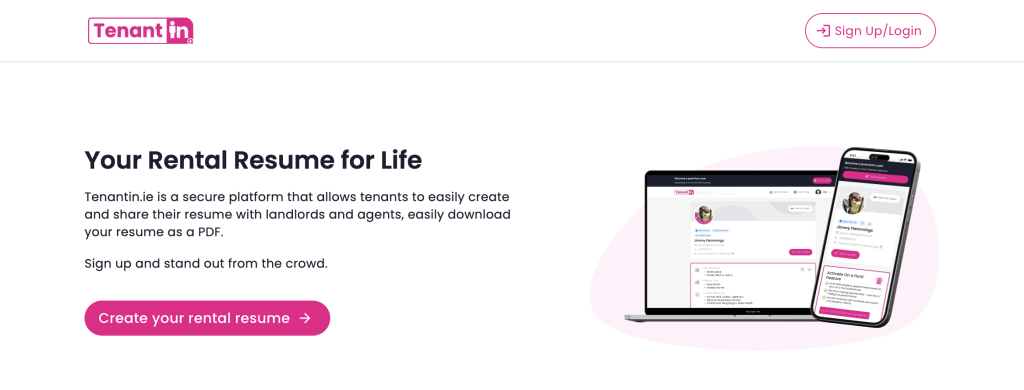If you’re renting in Ireland, the thought of your rent going up might be a constant concern. Between changing laws, Rent Pressure Zones, and the high demand for housing, it can be hard to tell whether a rent increase is fair or even legal.
This guide will help you understand your rights as a tenant, what landlords can and cannot do, and how to respond if you receive a rent increase notice. Whether you’re applying for a new home or updating your tenant resume, knowing the rules around rent increases is essential to staying protected.
Understanding Rent Pressure Zones (RPZs)
One of the most important concepts for any renter in Ireland is the Rent Pressure Zone, or RPZ. These are areas where rents are highest and rising quickly. To help stabilise the market, the government limits how much landlords can increase rent in these zones.
As of 2025:
- Rent increases in RPZs are capped at 2% per year, or the rate of inflation (whichever is lower)
- Landlords must wait at least 12 months between rent reviews
- Any increase must be based on the RTB’s formula, not on market rates or upgrades alone
Most major cities and urban areas are RPZs. You can check whether your property is in an RPZ using the RTB’s online tool.
If you live in one of these zones, be sure to include this information in your rental history. It shows awareness of your rights and can be helpful when communicating with landlords or housing support services.
Legal Rent Increases Outside RPZs
If your property is not in a Rent Pressure Zone, landlords still have to follow strict rules. Rent increases must be:
- Fair and market-based, using comparisons from similar properties
- Supported with evidence (e.g. three comparable rental listings)
- Issued with at least 90 days’ notice
- Reviewed no more than once every 12 months
Even outside of RPZs, a landlord cannot simply raise the rent without justification. All changes must be documented, and tenants are entitled to dispute unfair increases through the Residential Tenancies Board (RTB).
Keeping your tenant resume up to date with accurate rental information, including previous rent amounts and increase notices, can help you build credibility when applying for new rentals or if you need to challenge an unfair hike.
What Makes a Rent Increase Illegal?

Unfortunately, not all rent increases follow the law. Here are some red flags to watch out for:
- Increases that exceed the legal limit in an RPZ
- A landlord increasing rent multiple times in a 12-month period
- No written notice of the increase (or a notice with missing details)
- Rent increases applied retroactively
- No evidence provided to support the new amount outside an RPZ
If you receive a rent increase notice and you’re unsure whether it’s valid, check the RTB website, speak to a housing adviser, or contact the RTB directly. Illegal increases can be reversed, and tenants may be entitled to a refund.
How to Respond to a Rent Increase
If you’ve received a notice about a rent increase, don’t panic. There’s a process to follow:
1. Check the Validity
- Is your property in an RPZ?
- Has it been 12 months since the last review?
- Is the notice in writing and signed?
- Does it include the required formula or market comparisons?
2. Ask Questions
If something doesn’t look right, ask your landlord for clarification. Most landlords are willing to explain their reasoning, and in some cases, the issue may be a simple misunderstanding.
3. Use Your Records
This is where your tenant resume and rental history become powerful tools. With all your data organised, you’ll be able to compare your old and new rent and confirm whether the increase follows the rules.
4. Challenge If Needed
If you believe the increase is illegal, you can submit a dispute to the RTB. There’s no penalty for standing up for your rights, and the RTB can help mediate or rule on the situation.
Why Documentation Matters: Protect Yourself with a Tenant Resume
Tenants who maintain good records have a much easier time defending their rights. That’s where tools like Tenantin.ie come in. As a free platform, Tenantin helps you:
- Build a digital tenant resume
- Log your rental history and landlord contacts
- Record employment and personal details, helping landlords trust your profile
- Share your resume directly with private landlords when applying for a rental
An updated tenant profile is especially valuable when facing rent disputes or when you’re looking to move. Landlords appreciate well-organised tenants, and having your documents ready puts you ahead of others who don’t.
When Landlords Make Upgrades: Can They Increase Rent?
Sometimes landlords will try to justify rent increases based on property improvements. This can be valid in certain cases, but there are rules.
In RPZs:
- Rent increases due to “substantial change” must meet specific criteria
- Cosmetic upgrades or small repairs do not count
- Major structural changes (like adding a room or significant energy upgrades) may qualify
Even then, landlords must notify the RTB and justify the increase. If you’re unsure whether a change qualifies, you can find details on the RTB’s website or speak to a housing adviser.
Make a note of any upgrades in your Tenantin rental history so you have a full picture if a rent increase follows.
Stay One Step Ahead with Premium Support
Understanding rent laws is one part of the puzzle. Finding your next home is the other. Tenantin’s “On a Hunt” premium feature gives tenants a huge advantage by:
- Sending daily email alerts for listings across multiple platforms
- Automatically applying to suitable properties on your behalf
- Assigning a dedicated Account Manager for hands-on support
- Promoting your profile to active landlords on FindQo.ie
With the rental market being more competitive than ever, a professional tenant resume and faster application response can make all the difference.
Knowledge Is Power for Renters

Rent increases can feel stressful, but the more you know, the more control you have. Staying informed about what’s legal (and what’s not) empowers you to protect your tenancy, plan ahead, and avoid unnecessary costs.
Whether you’re documenting your rental history, applying for a new property, or just want to be ready for what’s next, Tenantin.ie is here to help. With our free resume builder, easy profile tools, and premium support options, we make renting in Ireland easier for tenants like you.
Frequently Asked Questions
Where can I find more information about my rights regarding rent increases?
For comprehensive details on your rights as a tenant and up-to-date information on rent increases, visit tenantin.ie. They provide valuable resources and guidance tailored specifically for renters in Ireland, helping you navigate the complexities of renting with confidence.
Understanding your rights when it comes to rent increases can make a significant difference in ensuring you’re treated fairly as a tenant in Ireland’s dynamic rental market.






